Archive

Tagore Meets Einstein. A Panel Discussion (Sunday, March 23rd 7 pm)
Kolkata, Science City, Pavilion
One of two public events organised by Heidelberg Centre South Asia (HCSA) during the DWIH’s Excellence on Tour, was the Panel Discussion on “Tagore Meets Einstein”. This event aimed at paying tribute to two prominent thinkers of the 20th century, epitomising a most fruitful encounter between Indian and German celebrities.
Rabindranath Tagore and Albert Einstein, the two cult figures of the 20th century in the worlds of literature and science, met for the first time in 1926 in Düsseldorf, although no records exist of their conversations during this meeting. Conversations between the two icons took place during their second and third meetings in 1930 in Germany and have been recorded and published. The first conversation on the nature of reality took place on July 14th at Einstein’s residence in Kaputh and the second one on causality and music on August 19th at the residence of a common friend, Dr. Mendel.
During the Panle Discussion, the three speakers have highlighted these two eminent characters, from their respective disciplinary angles. Prof. Dattagupta, Vice Chancellor of Visva Bharati University, Santiniketan and Humboldt Fellow, has focussed on Einstein and his groundbreaking theory on Quantum Physics. Prof. Partha Ghose from the S.N. Bose Institute of Physics has elaborated on the first recorded encounter, where they had discussed Causality. This was followed by Romit Roy, Professor at Visva Bharati University, who elaborated the discussion on Music. The panel discussion will be moderated by Prof. Rekha Rajan (JNU, New Delhi and current Humboldt Ambassador).
The Panel Discussion was followed by a lively discussion among the panelists and with the wider audience.
Rabindranath Tagore and Albert Einstein, the two cult figures of the 20th century in the worlds of literature and science, met for the first time in 1926 in Düsseldorf, although no records exist of their conversations during this meeting. Conversations between the two icons took place during their second and third meetings in 1930 in Germany and have been recorded and published. The first conversation on the nature of reality took place on July 14th at Einstein’s residence in Kaputh and the second one on causality and music on August 19th at the residence of a common friend, Dr. Mendel.
During the Panle Discussion, the three speakers have highlighted these two eminent characters, from their respective disciplinary angles. Prof. Dattagupta, Vice Chancellor of Visva Bharati University, Santiniketan and Humboldt Fellow, has focussed on Einstein and his groundbreaking theory on Quantum Physics. Prof. Partha Ghose from the S.N. Bose Institute of Physics has elaborated on the first recorded encounter, where they had discussed Causality. This was followed by Romit Roy, Professor at Visva Bharati University, who elaborated the discussion on Music. The panel discussion will be moderated by Prof. Rekha Rajan (JNU, New Delhi and current Humboldt Ambassador).
The Panel Discussion was followed by a lively discussion among the panelists and with the wider audience.
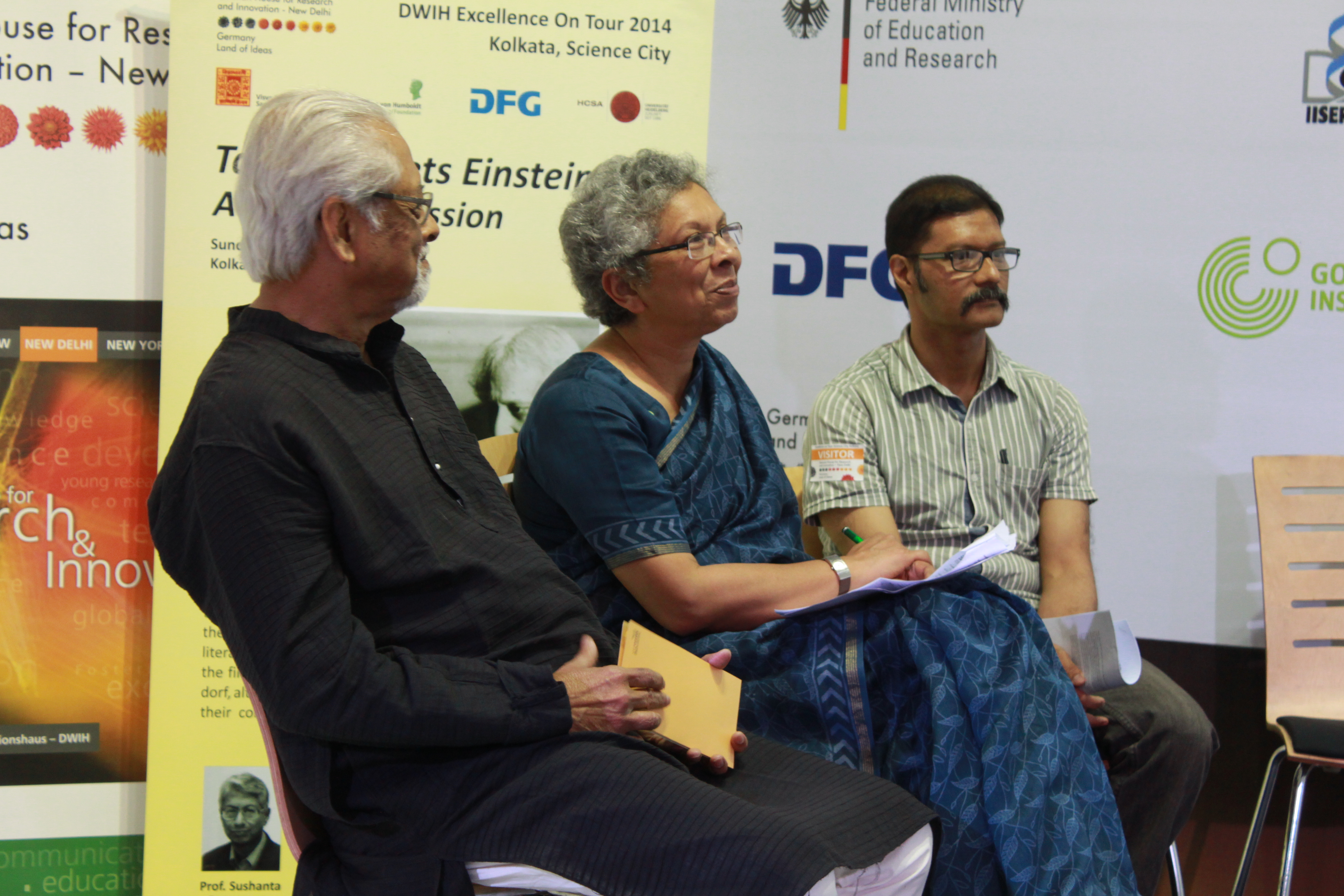 | 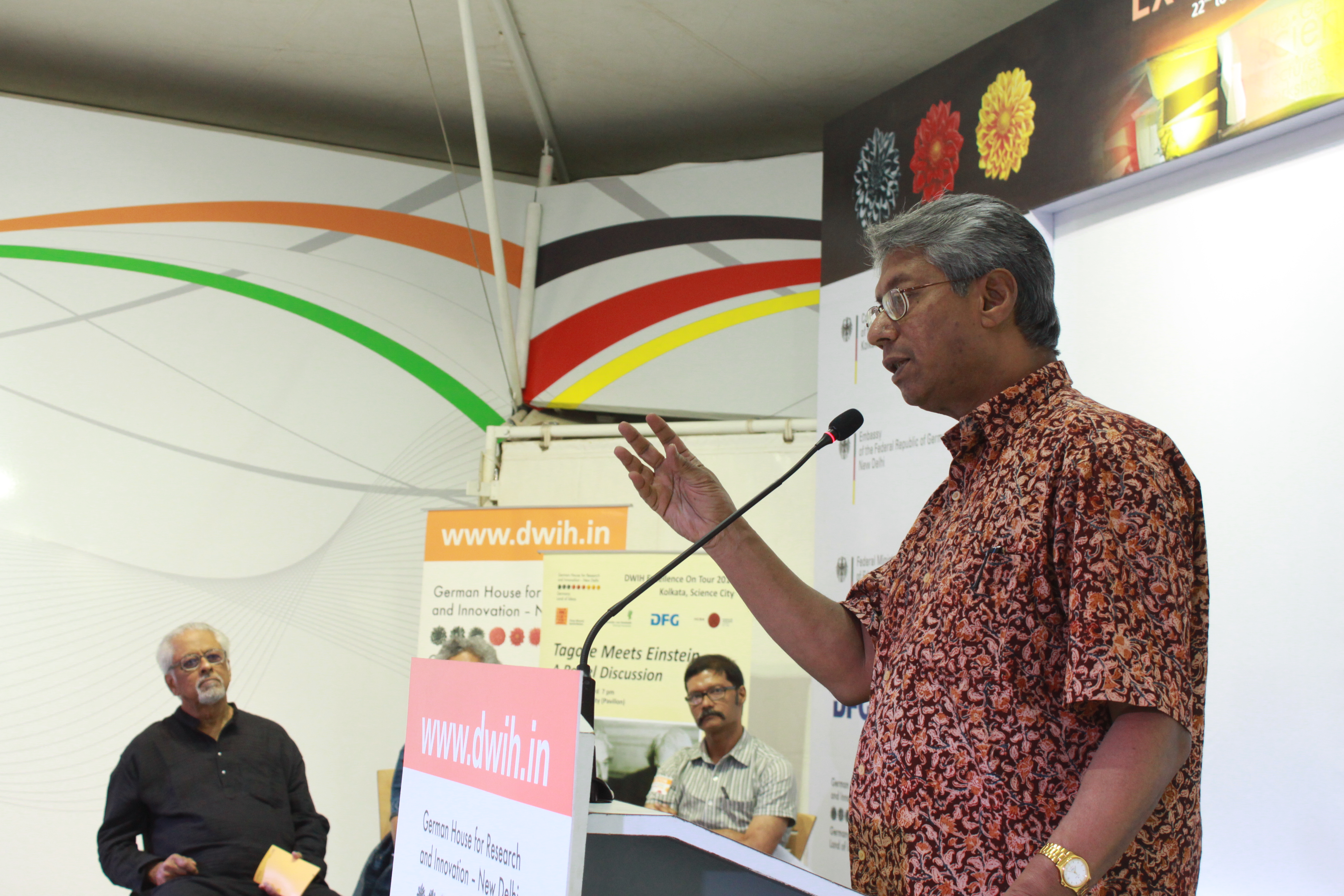 |
Posted on 02 Apr 2014
Joint Regional Conference 2014 Inclusive Youth Policies in South Asia
| Kathmandu and Lalitpur, February 26-28th 2014 The Delhi Office of the South Asia Institute (SAI) of Heidelberg University, together with our partners from the Social Science Baha (SSB), Colombo University, and the SAARC Office of the Konrad- Adenauer-Stiftung (KAS) New Delhi have co-organised a Joint Regional Conference on “Inclusive Youth Policies in South Asia”. The Conference was held from February, 27 - 28th 2014, at Godavari Resort (Lalitpur), and the official opening took place at the Hotel de l’Annapurna in Kathmandu (February 26th). It was a follow up event of similar Regional Conferences on “Governing Youth in South Asia” (Kathmandu, September 2013) and “Youth in South Asia” (Colombo, March 2012). About 45 participants had been invited from across the region (Bangladesh, Bhutan, India, Sri Lanka, Pakistan and Afghanistan, along with numerous participants from Nepal). The main aim of this Conference was to bring together scholars, policy makers, development partners, and Youth Organisations from across South Asia who can contribute to strengthen-ing the crucial links between research on issues that are of core relevance for youth and youth policies. Whereas research on youth is of high relevance world wide, we would argue that to carry out such research on youth in South Asia is of pivotal importance, given the numerical and socio-political significance of youth. By facilitating a dialogue with these different experts and interest groups, the Conference intended to set up a forum for research and policy debates, and contribute to fine tune and strengthen inclusive youth policies. This year’s Conference was inaugurated by a Key Note Address from Prof. Siri Hettige, Colombo University on “Governance and Youth Policies in South Asia”. The function, held at Hotel de l’Annapurna, Kathmandu, had a large audience of about 140 persons, and was followed by a lively Question and Answer session. The conference itself was held at Godavari Village Resort on 27th and 28th, with about 50-60- participants. Panels focused on Youth as Active as Citizens for Inclusive Democracy, Youth Policies in South Asia – A Critical (Re-) Assessment, Youth and Their Right to Education and Health, as well as on Youth Surveys. During the panel on “Youth as Active Partners for Development”, youth activists from across the region could share their concerns and experiences, and speakers were from Pakistan, Afghanistan, Bangladesh and Nepal. | 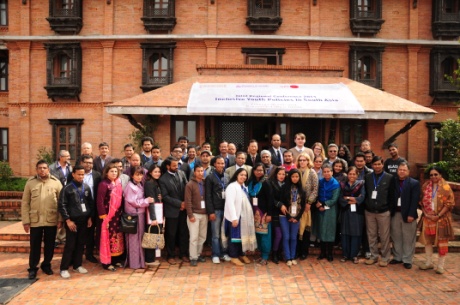 The group of participants (February 27th) The group of participants (February 27th)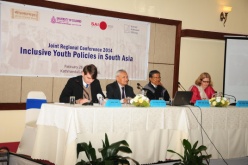 Prof. Siri Hettige, Colombo University during his Key Note Address, with Marcel Schepp (KAS, New Delhi), Prof. Nirmal Man Tuladhar (SSB) and Dr. Elvira Graner (SAI/HCSA, New Delhi)  Q&A session after the Keynote Address, at Hotel de l’Annapurna 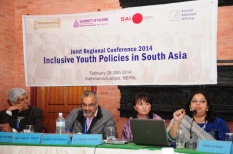 Panel on “Inclusive Youth Policies,” with Venkatesh Srinivasan (UNFPA, New Delhi), chair Ram Bd. Chhetri (Tribhuvan Univ., Kathmandu), Rinzin Wangmo (Min, of Education, Bhutan) and Fatema Samina Yasmin (Dhaka Univ., Bangladesh) |
Posted on 10 Mar 2014
India visit of Prof. Matthias Bartelmann (Astrophysics, Heidelberg University)
| Following an invitation from the Heidelberg Centre South Asia (HCSA) in New Delhi, Prof. Bartelmann has come to India for a visit to New Delhi and Bangalore. At New Delhi, he held a public lecture, hosted at the Goethe-Institute/ Max Mueller Bhavan (MMB) entitled “Understanding the Cosmos. An Endeavour without Borders” (January 28th, 6.30 pm). The lecture was the fourth one of the DWIH Joint Lecture Series “Humboldts Erben” (Humboldt’s Heirs) that is co-organised by several consortium partners, including HCSA, DFG, DAAD, and the current one also by the Max-Planck-Gesellschaft (MGP), and MMB. The lecture gave a comprehensive analysis of the fundamental changes that have taken place in astronomy and astro-physics, expanding the notion of Humboldt’s of Kosmos. It was well attended by a scholars and students, and followed by a lively question-and-answer session, as well a reception. Later on, Prof. Bartelmann also visited the Indian Institute of Astrophysics (IIA) at Bangalore, where he gave a lecture about his current research focus “The internal structure of galaxy cluster”. There, the audience largely comprised of colleagues and Ph.D. students. Again, there were lively and highly scholarly debates. Prof. Matthias Bartelmann from Heidelberg University is a renowned Professor of Theoretical Astrophysics at Heidelberg University. He has joined Heidelberg University in 2003, after having been a Post-Doc at the Harvard-Smithsonian Center for Astrophysics, as well as a senior researcher at MPI for Astrophysics, Garching. | | |    |
Posted on 03 Feb 2014
<< Previous 1 2 3 4 5 6 7 8 9 10 11 12 13 14 15 16 17 18 19 20 21 22 23 24 25 26 27 28 29 Next >>
Webmaster: E-Mail


